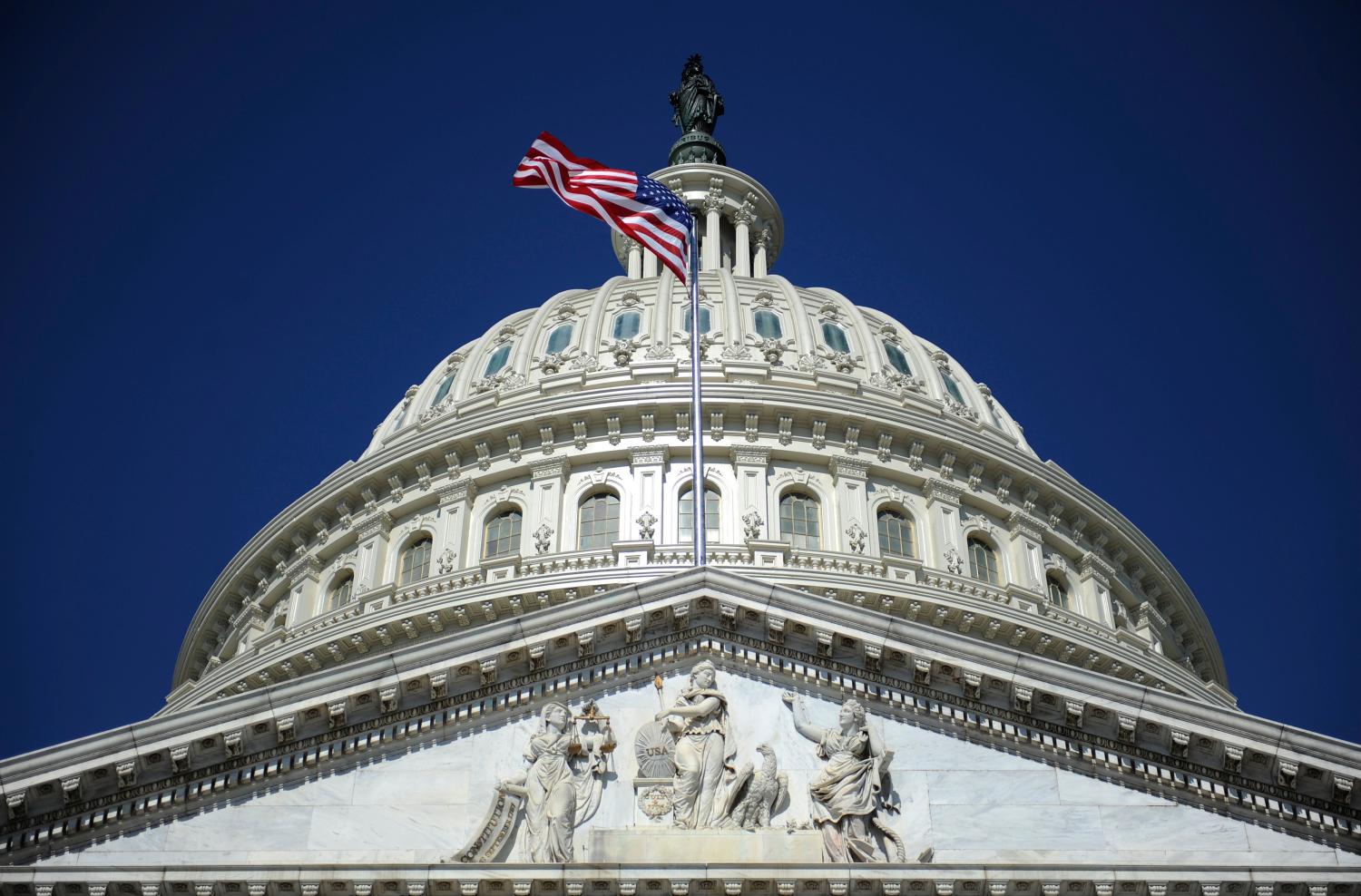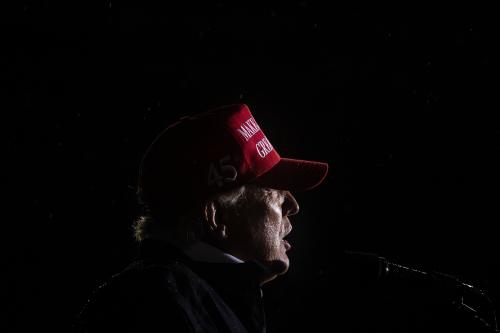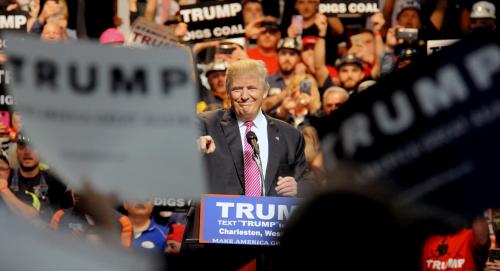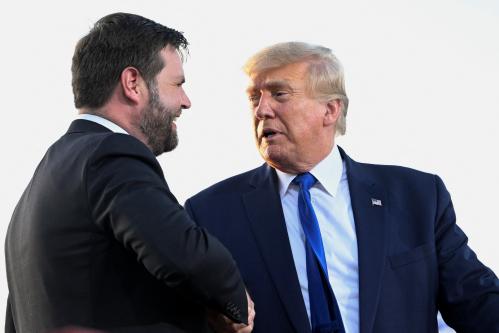Party primaries are now the most consequential elections in American politics. With more and more states and congressional districts becoming dominated by one party or the other, the most consequential choices for voters come in party primaries. At the Brookings Primaries Project, we are studying all the candidates in congressional primaries. This is the fourth piece in that project. Special thanks to Andy Cerda, Jordan Muchnick, Sylvia Garrett, John Hudak, Avi Gulati and Ethan Jasny for their work on it.
It will come as no surprise to anyone that for Donald Trump the biggest, most important issue in this year’s election is—Donald Trump; specifically, his contention that he actually won the 2020 presidential election. Although the argument could be made that it’s time to move on and talk about issues like inflation that are closer to the voters’ concerns, Trump is anything if not consistently impervious to everything except the needs of his own ego. This is the big issue for Donald Trump in the 2022 midterms, but is it the issue for everyone else? Let’s see.
One of Trump’s earliest post-2020 vendettas was against incumbent Republican Georgia Gov. Brian Kemp who refused to accommodate Trump’s demands to give the state’s electoral votes to Trump once it became clear that he had, indeed, lost the state. Trump vowed to defeat him and recruited the state’s former U.S. Senator David Perdue to run against Kemp. He campaigned hard for Perdue, but mostly against Kemp, saying in one rally “Brian Kemp is a turncoat, he’s a coward and he’s a complete and total disaster… he sold you out.”
Evidently, Georgia voters thought otherwise, giving Kemp a resounding victory over Perdue on Tuesday night. As of this writing, it looks like Trump will take another beating in Georgia. The incumbent Republican Secretary of State, Brad Raffensperger, who turned down Trump’s request that he find “just enough votes” to overturn the results of the presidential election in Georgia, was another of Trump’s targets. Sec. Raffensberger overwhelmingly won more votes than his nearest competitor, Rep. Jody Hice (a Trump endorsee) and Raffensberger may well win the primary outright without moving to a runoff.
Looking back at previous races, the Republican gubernatorial candidate in Nebraska, Charles Herbster, was a big fan of the Big Lie. He attended the January 6 rally and met with Trump and a group of Republican funders the night before. He, too, lost his primary.
On the other hand, Trump’s insistence on the Big Lie seems to have helped Doug Mastriano, the Republican nominee for Governor in Pennsylvania, sail to victory. Although, it is widely thought that going as far right as Mastriano did will hurt him in that state’s general election.
Turning to Congress, as part of the focus of Brookings’ Primaries Project, so far 493 candidates have run in Republican primaries for House and Senate. Our team looked at the candidates’ websites, their Facebook pages, their tweets, and into press interviews in order to ascertain their position on a range of issues. Among the variables for which we coded, we looked at three different attitudes towards the 2020 presidential election. One was the candidate’s general position on election integrity. Some candidates tended to support voting reforms that made it harder to cheat, while others were in favor of voting reforms making it easier to vote.
Next, we looked at how the candidate viewed the 2020 election specifically. Some candidates were willing to say that Biden’s victory was fraudulent (the Big Lie) and that Trump would have won without voter fraud. Others simply said that the election should have been investigated further but don’t go so far as to call Biden’s victory fraudulent. And lastly, we coded those who believed that Biden won the election fairly.
Finally, we looked for statements indicating how the candidate felt about the insurrection on January 6. Some candidates were supportive and viewed the day’s events as the work of patriots legitimately protesting a corrupt election. Others called it a violent insurrection/coup attempt and called for steps to protect democracy.
The results of our coding are contained in the following charts.
The most important thing about these charts is how many Republican candidates, in spite of Trump’s constant obsession with the Big Lie simply refused to talk about it in their election materials.
Forty-four percent of Republicans made general comments about reforming election laws to protect election integrity, but more than half made no mention of election integrity at all. Even fewer Republican candidates weighed in on whether or not Trump had won the 2020 election. Nearly three-quarters of all the Republican candidates had nothing to say about the issue foremost in Trump’s mind and even more Republican candidates–87%–made no mention of the events of January 6.
| Election Integrity | # of Republicans |
| In favor of voting reforms making it harder to cheat | 215 (43.6%) |
| In favor of voting reforms making it easier to vote | 13 (2.6%) |
| No mention | 265 (53.8%) |
| View of 2020 Election | # of Republicans |
| Candidate believes Biden’s win was a big lie and Trump would have won without voter fraud | 43 (8.7%) |
| Candidate believes the election should have been investigated further but doesn’t claim Biden is illegitimate | 75 (15.2%) |
| Candidate believes Biden won the election fairly | 8 (1.6%) |
| No mention | 367 (74.4%) |
| January 6 | # of Republicans |
| Jan. 6 was the work of Patriots legitimately protesting a corrupt election | 27 (5.5%) |
| Jan. 6 was a violent insurrection/coup attempt and steps must be taken to protect democracy | 36 (7.3%) |
| No mention | 430 (87.2%) |
Attention to the Big Lie was much more prevalent among those Trump endorsed. But even there, enthusiasm for the Big Lie was muted. Seventy-six percent all of those endorsed by Trump endorsed election reforms designed to protect election integrity. But only 11% were willing to go so far as to say that Trump definitely won. Instead, they took the safer middle ground calling for more investigations. And when it came to attitudes about January 6, twice as many Trump endorsees were critical of the events of that day as were endorsees who called it “patriotic,” while more than half stayed away from the issue altogether.
| Election Integrity | # of Trump Endorsees |
| In favor of voting reforms making it harder to cheat | 60 (75.9%) |
| In favor of voting reforms making it easier to vote | 3 (3.8%) |
| No mention | 16 (20.3%) |
| View of 2020 Election | # of Trump Endorsees |
| Candidate believes Biden’s win was a big lie and Trump would have won without voter fraud | 9 (11.4%) |
| Candidate believes the election should have been investigated further but doesn’t claim Biden is illegitimate | 36 (45.6%) |
| Candidate believes Biden won the election fairly | 4 (5.1%) |
| No mention | 30 (38%) |
| January 6 | # of Trump Endorsees |
| Jan. 6 was the work of Patriots legitimately protesting a corrupt election | 10 (12.7%) |
| Jan. 6 was a violent insurrection/coup attempt and steps must be taken to protect democracy | 26 (32.9%) |
| No mention | 43 (54.4%) |
This week’s primaries sow further doubt on Trump’s control of the Republican Party. As we pointed out last week, more than half of the Republican candidates in these red states and red districts stayed away from talking about Trump in their campaign materials.
This week, Donald Trump lost two high profile “revenge” races in Georgia, further weakening his position as undisputed leader of the Republican Party. If Trump isn’t a big winner in the heavily conservative and Republican states that have held primaries so far—where will he win?
The Brookings Institution is committed to quality, independence, and impact.
We are supported by a diverse array of funders. In line with our values and policies, each Brookings publication represents the sole views of its author(s).










Commentary
The Georgia Republican primary: bad night for the Big Lie
May 25, 2022